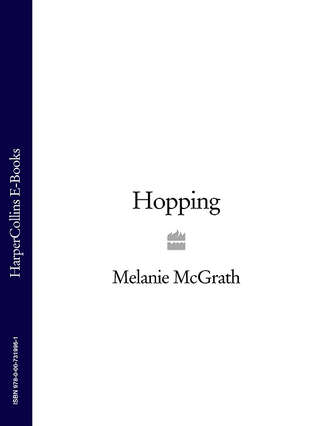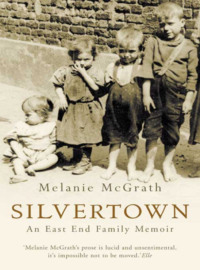
Полная версия
Hopping
The tide was up and the wide black water tumbled beneath them, but they did not stop to admire the dark cords of lighters bobbing around on the tarry surface, nor the belching little tugs slicing through the currents, nor even the elegant tea clippers that sat outside the London Dock in the Lower Pool, their slender masts lit by the light of paraffin lamps on passing tugs. In all her eleven years, Daisy had never been so far from home. She tried to remind herself that Poplar was just there, just a mile or two downriver, and in a few hours’ time her father would be somewhere on this water, sculling between ship and shore, but she felt frightened and a little homesick and she missed her mother and could not help but feel that she was in some way responsible for everything that had happened.
They reached the end of the bridge and Mrs Shaunessy led the little party along Tooley Street, through a set of immense yellow columns and into London Bridge Station. Inside, they were greeted by a great hoot of noise, a bluster of men and women and a whorl of pearly smoke. Everywhere there were women and children dragging carts and boxes or standing beside towers of cheap cardboard suitcases, some singing, others shouting instructions to the porters, but everyone seemed good-spirited and happy and for now, at least, Daisy was reassured.
Mrs Shaunessy collected her charges together beside a large crudely painted sign, reading Hoppers’ Specials!, and with three fingers pointing to, respectively, the High, Central and Low Levels.
Now, she said, me and Billy is going to run along and get the tickets so you stay there. Don’t you move none and don’t speak to no strangers.
Daisy felt a sly, hard pinch on her arm. She moved over very slightly and stamped on Billy’s foot. The boy shot her an evil look and bit his lip, but said nothing and moved off with his mother, limping slightly.
Ever since she’d known them, which was all her life, Mrs Shaunessy’s family had gone hop picking in the late summer. Mrs Shaunessy said the fresh air and exercise were good for children, and the space and time apart were good for husbands and wives. There was nothing like the freedom that you felt on a long evening with the fires burning and someone striking up a song, she said, knowing that the next day there would be no step to whiten, no coal to heave, no blacking of the range, no boiling laundry or wiping smuts from windows that would be smutty again twenty minutes later.
Most of the Crommelins’ neighbours went to the hop. In fact, almost everyone Daisy knew, including Lilly, had at least one hopper in the family. Daisy didn’t know why the Crommelins had never been. Her mother had once said she thought it was common, so perhaps that was it. Perhaps it had something to do with her mother’s poor health.
The Shaunessys returned in a flash, Mrs Shaunessy carrying two slips of paper, and they soon found themselves on a long platform beside which stood an immense, sooty train. Daisy and Franny heard them coughing along the railway tracks at Poplar, but they had never seen one so close and looking so huge. Mrs Shaunessy parked her hop cart and began looking up and down the platform, then she turned to Daisy and said:
When I say to get on the train you do it and sharpish. Not a second early, not a second late. Billy here will help me with the pram.
She leaned down into the pram again and, pretending to fluster with the baby blanket, whispered:
And not one tiny word from you, miss, not a bleep or a toot. Babies go free and for now you’re one of them, or your father will be paying the price of your ticket.
Soon a whistle blew and Mrs Shaunessy lunged forward. Elbowing several women out of the way, she swung open the door of the carriage and hissed, Now! Billy, for whom this was an annual routine, leapt to the top of the steps, and helped his mother yank and heave the hop box on to the train, then did the same again for the pram.
They took up a bench in the middle of one of the emptier carriages. Mrs Shaunessy parked the pram beside her so that the hood was facing outwards into the corridor and Franny’s face was obscured. Not long afterwards the train hooted and began to lurch from the station.
Now Daisy, ducky, Mrs Shaunessy said, laying her overcoat and a blanket on the bench and spreading her skirts across it, you just creep under here and don’t make no noise. She lifted the coverings. And don’t you come out a second before I tell you to, or you’ll be bringing a whole heartful of trouble down on me. No noise, mind, quiet as mice.
Under Mrs Shaunessy’s overcoat and skirts it was dark and foisty and the prevailing smell of damp and mothballs was so penetrating that for a while Daisy felt as though she might be sick. The train gathered speed, some minutes passed, then she became conscious of a man’s voice asking for tickets, after which there was some hasty movement of Mrs Shaunessy’s skirts and she heard Mrs Shaunessy saying:
Only me and the boy, mister, plus the babe there, but she goes free, now, don’t she?
Eventually, she became accustomed to the cloying whiff and the warmth and the gentle tick-tocking of the train did their work and she remembered nothing more of the journey until she was pinched awake by Billy Shaunessy and, surfacing, saw to her astonishment that they had left the world she knew and had entered a new and strange one. The sun was rising but instead of the dun glimmer that signalled the start of the day in Poplar, everything was bathed in the colours of silk freesias. All along the carriage women and children were gazing from the windows and a hushed silence had fallen of the sort Daisy usually associated with the moment her mother put hot food on the table. She clambered to the window and took her place at it.
At first she saw only a blur of unfamiliar shapes within which she could discern no building, no factory, no street or row of shops, no market or press of people. When she tried to focus on a single object outside the train it raced away from her. Gradually she began to pick out gentle slopes, wooded knolls and copses, and stands of trees. Between the trees, she could see now, the great green swell was divided here and there by little green walls enclosing streets of gnarly trees or bushes, and dotted inside these walls were cows like the ones she’d once seen at Limehouse dairy. A few lonely-looking buildings, which Daisy took to be factories or poorhouses, were dotted about. Some of these were circular and topped with cones on which sat white dunce’s caps. She remembered with a jolt what Billy had once said about her mother: Me mum says your mum’s jigged in the bonce and got put in a fool hasylum. She wondered whether these, too, were hasylums. The distance to the horizon took her breath away. She hadn’t imagined the world could be so big. Where the sky met the land there was a ribbon of such vivid blue that it reminded Daisy of the turbans of certain Lascar sailors.
Soon, they were passing streets of red-brick houses and the train began to slow and, for an instant, until she saw the sign on the platform, which read Faversham, Daisy thought they were back in London. A great many women and children stepped off the train and there was a short commotion of baggage and shouted instructions before the carriage doors slammed and the engine began to heave itself from the station once more. They hadn’t been going long before there was a loud whoosh of air and they were crossing a bridge with a high embankment painted with pink and yellow flowers, then descending towards a tiny cluster of houses separated by meandering paths banked with hedges. It all looked so empty and old and crooked, Daisy thought, like the pictures on biscuit tins, only without the courting couples.
Soon Daisy felt the engine begin to slow again and she noticed Mrs Shaunessy fussing with her things. They helped Franny out of the pram and the train came to a halt beside a neat brick and clapboard building decorated with fancy cut-out work. From this hung a sign reading Selling. Billy Shaunessy opened the door, leapt on to the platform and reached back in to receive the hop box and the pram. Once everything was unloaded, Mrs Shaunessy signalled for the children to follow her down the platform. A party swung by laughing wildly and chanting:
Oh, they say hopping’s lousy
I don’t believe it’s true.
We only go down hoppin’
To earn a bob or two,
Oooohhhh, with an ee- aye- o, ee- aye- o, ee- aye- ee- aye- o
Among them, Daisy recognised familiar faces. She was struck by how much smaller everyone looked out here, in this new world. It was as though the countryside had reduced them all to dolls.
Despite all the jollity, or perhaps because of it, Franny was unimpressed with their new surroundings.
I want me dad, she wailed, shuffling in close to her sister. I wanna go ho-ome.
But Daisy knew there was no hope of going home soon. London was an almost infinite distance away, behind endless hills and trees. The air felt thin and cutting, its smell something between river mud and the salted cabbages Jews sold out of barrels. She took in a deep breath, picked up her bag, grabbed her sister’s hand and began to shuffle down the platform towards the station building.
We’re here now, Franny, she said. Let’s make the best of it, eh?
She spotted Mrs Shaunessy up ahead, waving, and they stepped through the station building on to the soft ooze of a cinder path, its give under the feet strangely unsettling, like the grass in Tunnel Park after the river had flooded.
Opposite the station stood a handful of red-brick cottages spread out along a flinty road coloured rosehip pink in the early sun. Up ahead, Mrs Shaunessy was making her way towards a rustic wagon watched over by a solid-looking carter, who wore the kind of thick, crescent-shaped beard Daisy had only seen before on the very old men who lined up outside the Sally Army soup kitchen waiting for food. The carter was directing two nut-brown assistants in billowing shirts as they hoisted hop boxes and suitcases into the wagon, and when that was done, he shouted, Hoi, hoi to his horse and the wagon began to trundle along the flinty road and away.
Mrs Shaunessy took hold of the pram and began striding off after it, and they made their way through the village, which seemed to consist of a single row of modest houses whose red bricks had grown speckled from the salted wind swooping in from marshes a few miles to the north. The houses did not give directly out on to the street as they did in Poplar, but were fronted by neat little plots planted with vegetables and fruit bushes. Everywhere there were trees, leaves clattering alarmingly in the breeze like panicked hoofs on distant cobbles.
Ah, save us, said Mrs Shaunessy, breathing in deep. The cabbagey, empty smell had been replaced now by a thick and tarry aroma. If it ain’t the hops.
Just then the wind blew up again, scattering pieces of straw across the road.
It stinks, shrieked Franny, burying her face in her sister’s coat. I want to go home.
Billy Shaunessy raised his eyes to heaven and kicked a stone.
Listen to Little Miss Muck, Mrs Shaunessy said, not unkindly. Before the week’s out she won’t want to be nowhere else. Ain’t that right, Billy boy?
Billy grunted and kicked another stone.
They passed a road sign reading Neames Forstal and Mrs Shaunessy explained that Selling station wasn’t actually in Selling, but not to worry because everything would become clear.
Pretty soon they had left Neames Forstal behind entirely and were progressing along a deeply rutted road that slid between hedges embroidered with the lace umbrellas of hogweed and pink bladder campions. Others joined them, greeted each other and exchanged gossip. Every so often, when someone she recognised overtook them, Mrs Shaunessy would shout out:
Flossie Felcher, well I never! or Janey Simpson, now don’t you look a picture. You ain’t never had another little ’un! and the two women would look one another up and down, shake their heads over the general state of things and vow to have a good catch-up later on.
After a while, they crossed a footpath that dipped down into a little valley filled with apple orchards, and these in turn gave way to a wood. They could still see the wagon up ahead, the carter slapping his horse from time to time with the reins. The hedgerow here was lined with wildflowers between which danced pretty little blue and brown butterflies.
Look, Franny said, momentarily forgetting her misery to toddle along the bank scooping at the creatures with her hands. Baby birds!
They walked on, past a huge grey house and a cluster of smaller cottages, the most distant of which gave on to fields sprinkled with the cone-hatted houses. Far to the north was the glittering strip of blue Daisy had seen from the train.
They stopped finally, beside a mossy oak gate guarding the entrance to a large grassy field. The carter and his assistants were already unloading the bags and boxes and piling them up on the verge and there were women and children reloading their belongings into wooden wheelbarrows. Beyond the gate, the field rose before them. At its farthest fringe sat a row of whitewashed huts, and outside the huts there were women moving to and fro and children playing. Fires had been lit and some of the women were stirring pots hanging over the flames. Mrs Shaunessy located her hop cart in the melee and was busy pulling it towards the pram, guarded by Billy.
Well, don’t just stand there like a pair of pickles. Get pushing! she said.
They were part-way up the slope when a girl came running down to meet them.
What you doing here, Doze? It was Lilly Seldon. So relieved was Daisy to see her friend that for a moment she thought she might burst into tears.
Lilly took the pram handle and began helping to push.
Daisy said that for some reason to do with the war and her mother, they had come with Mrs Shaunessy. When she’d asked for an explanation, Mrs Shaunessy had placed her finger on the bridge of her nose and shaken her head, saying, Now, now, nosy parker. Curiosity killed the cat.
I suppose your mum’ll fetch you when she gets back, Lilly said.
Daisy looked up, past the huts through the thicket of trees to the cloudless sky above.
I suppose, she said. She looked down at her feet. Talk of her mother sent a pulse of shame through her, then another of guilt for the shame. She knew it was something more than rest her mother needed. Perhaps Billy Shaunessy was right and Elsie was in a dunce hasylum. A leafy stalk had attached itself to her boot and when she bent down to pluck it off, the stem stuck to her fingers. She pushed it away only to have it attach itself to her leg.
Goosegrass, you doze, Lilly said, laughing. She plucked it off between two fingers and flung it into the hedgerow. I’m glad you’ve come.
Like all the other huts, hop hut number 21, about halfway along the field, was put together from rough planks set on to a strip of concrete and roofed in tarpaper. It had a window roughly glazed and a stable door made from whitewashed planks fixed with padlocks, which Mrs Shaunessy was busy unlocking. She passed Daisy a bucket and told Lilly to show her where to fetch water. A queue of children stood noisily beside the single tap serving the huts. As Lilly and Daisy waited their turn, Lilly pointed out the cookhouse, the path leading to the hop gardens and, at some distance away, a shed that served as the privy. When they returned with the water, Mrs Shaunessy handed them each a rag and told them to begin wiping the walls. Inside, it was dark, the air was oddly still and there was a familiar smell of dampness overlying another, earthy aroma. Cobwebs lay across every surface and, as they scrubbed, huge spiders, evicted from their homes, scuttled away into the darker corners. While they worked, Mrs Shaunessy laid a piece of lino on the mud floor. That done, she began hanging pots and cups on hooks and stringing a makeshift curtain at the window, instructing Daisy and Lilly to busy themselves stuffing a palliasse with straw from a bale left outside the hut. Pretty soon, a man with a lazy eye and a squint and a plump, homely-looking woman arrived. It seemed that the man was Mrs Shaunessy’s brother, Alfie, and the woman, Joan, was his wife. Later, an old woman with metal hair rollers and a witchy-looking goitre fetched up and sat herself down on a sawn-up log outside the hop hut next door. This was Nell, with whom Daisy, Franny and the Shaunessys would be lodging.
By five their chores were done and they sat on the grass outside, which was long, unlike park grass, and ate jam sandwiches and drank hot tea. Franny asked whether they were having a picnic and Daisy said they were but then Franny said her sandwich tasted of grass and began to cry.
Tired, overexcited, said Mrs Shaunessy, carrying Franny into the hut and shooing the older children off to play.
Lilly took Daisy along a pathway that ran into the wood beside the huts. There were fairies there, she said – she knew because she’d seen them. Light fell through the leaves and lit the path with little sparkles. The stillness and quiet inside the woods were so peculiar and so daunting, Daisy had to keep blinking to make sure she wasn’t caught in some odd dream. A thousand ideas flipped through her mind. They walked in silence for a while, reaching the edge of the wood and skirting a field. How many trees were there? Daisy wanted to know. Had Lilly ever counted them? Did the fields go on for ever or was it possible to reach their end? Why did the wind blow so fiercely and everything move? What was the point of houses that stood on their own? But Lilly only answered her with a shrug.
That’s just the way the country is, innit?
They emerged from the wood into an area of rolling fields, their brows studded with copses and with orchards and hop gardens nestled in the more sheltered places. Here and there they could see the bright painted cowls of oasts.
Daisy cast her eyes around the scene. The wind had died down now and nothing moved. She thought of the men in uniform heading for the docks, of Old Pigswill and the policeman shouting into his megaphone and her mother, in an asylum somewhere, at war with herself.
It’s all right here, ain’t it? Lilly said.
Daisy didn’t answer because she didn’t know.
By the time they returned to the huts, the air had begun to darken. The hoppers were already lighting smoky paraffin lamps and the sound of singing rose up in the sharp, leafy air and tangled in the trees. The two girls separated, each returning to her party. Nell was still sitting on her log and someone had studded the fire with roasting potatoes. They drank a cup of cocoa and sat round the embers listening to the adults gossiping. By the time Mrs Shaunessy packed them off to bed there were stars in the sky and in the branches of the trees bats were stirring, waiting to begin their night-time journeys.
From inside the hut, they could still hear the noise of laughter and singing. Franny fell asleep almost immediately but Daisy lay awake for a while, her sister’s breath warming her neck. She felt strange, expanded somehow, and wondered whether this was what happened in the country – there was so much space that you had to grow to fit it. Gradually, though, the extraordinary events of the day began to drift off and she felt her breathing deepen. It was still dark when she was woken by Franny’s little hands prising open her eyes. From outside came a faint panting sound and a tap-tapping. Sufficient moonlight filtered through the gaps in the boards to give Daisy a dusty impression of the interior of the hut. Old Nell was lying next to them, now, asleep, and on the palliasse beside lay Mrs and Billy Shaunessy.
I don’t like it here, Franny whispered.
Daisy held her younger sister and stroked her head.
Ssh. Tomorrow I’ll take you to where the fairies live.
I don’t want to see the fairies, Franny said, I want to see the toffee apple man.
When they next woke it was only half dark in the hut. Daisy thought she heard a man shouting, then his voice became fainter. Nell was no longer lying beside them and the smell of wood burning drifted in from outside. Daisy pulled on her clothes and boots and went out. It was only half light but already Alfie had a fire going and Mrs Shaunessy was busying over it with a tea kettle. The grass was hung with white cobwebs. Down by the long drops rabbits scudded along the fringes of the woods, their bobtails bloody with the sunrise. Daisy returned to the hut, woke her sister and helped her to dress, and Mrs Shaunessy set down a breakfast of bread and marge and warm milk, but Franny pushed hers away, saying she couldn’t eat with the trees watching.
After breakfast the girls followed old Nell, Alfie and Joan, and Billy and Mrs Shaunessy out of Pheasant Field, and along a small flinty lane and past another row of huts that Mrs Shaunessy referred to as the Dovers, because the pickers from Dover were staying there, to the dip that marked the boundary between Big Kit and Old Ground. Here, there was a fence of wide stakes which acted as a windbreak – Mrs Shaunessy called it a Poll Loo – and beyond the Poll Loo Daisy became aware of a great swell of talk and song and they found themselves at the entrance to a sort of country factory whose walls were made of leaves. Here dozens, maybe hundreds, of families milled about, laughing and chattering, and there was a slightly nervy, competitive air, which reminded Daisy of Chrisp Street market at half past seven in the evening, just before the costermongers began reducing their prices. Many of the families carried paraffin stoves, baskets of food and jars of tea, and most seemed to have covered themselves with sacks or heavy aprons. Among the throng, Daisy recognised Lilly, who waved and gesticulated. Then Mrs Shaunessy drew some sacks from her bag and, ignoring Franny’s protests, she began tying them round the girls with lengths of string, before covering herself. Not long afterwards, a man arrived on a chestnut horse and opened the gate and the women and children surged forward, elbowing and pushing anyone who got in their way.
Hold hands and don’t lose me, shouted Mrs Shaunessy, but this was easier said than done in the general scrum, and even though Daisy and Franny were used to crowds, even though they wandered daily through the most overcrowded alleys and rookeries in a fiercely overcrowded city, it was as much as they could do to keep themselves from being heaved upwards by the crowd and flung down and trampled.
The leaf factory was divided into long alleys marked by a kind of high fencing of poles and wire, along which the hop bines curled upwards to a height of 20 feet. Men were moving about directing families down the passageways, at the ends of which sat huge baskets. Up ahead they saw Alfie waving and shouting.
This is our drift.
Mrs Shaunessy turned to the two girls and through the din signalled them to wait and not do anything until Billy showed them how to pick. Not long afterwards, the man on the chestnut horse drew a large handbell from his saddle pouch. At the sound of the bell, a roar rose up from the crowd of the sort that Daisy had only ever heard before outside the football grounds, as hundreds of women and children dived as fast as they could into one or other of the green alleys, shouting and jostling. Alarmed, Daisy followed Billy, dragging Franny behind her as Billy elbowed his way inside the alley. The air suddenly felt dense and musty. Sprinkles of sunshine fell from the roof but otherwise the only light came from the now distant ends, and when her eyes had adjusted, Daisy saw Billy standing beside them with a thin twine in his hands, from which soft leaves flapped, like pieces of brushed cotton. Between the leaves hung bunches of papery grey-green buds. Billy dropped on to a piece of sacking. With his left hand he held fast on to one end of the twine, then quickly he ran his right hand along the bine, applying force whenever he reached a bunch of cones.






